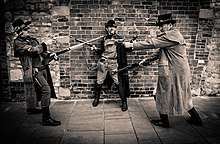Mexican standoff
A Mexican standoff is a confrontation in which no strategy exists that allows any party to achieve victory.[1][2] Any party initiating aggression might trigger their own demise. At the same time, the parties are unable to extricate themselves from the situation without suffering a loss. As a result, all participants need to maintain the strategic tension, which remains unresolved until some outside event makes it possible to resolve it.

The term Mexican standoff was originally used in the context of using firearms and it is still commonly implies a situation in which the parties face some form of threat from the other parties. The Mexican standoff is a recurring trope in cinema, in which several armed characters hold each other at gunpoint. There is no definitive requirement that the confrontation involve at least three parties.[3][2]
Etymology
The expression came into use during the last decade of the 19th century; the Cambridge Advanced Learner's Dictionary makes an unattributed claim that the term is of Australian origin. Other sources claim the reference is to the Mexican–American War or post-war Mexican bandits in the 19th century.[4]
The earliest print cite to the phrase was 19 March 1876 in a short story about Mexico, an American being held up by a Mexican bandit, and the outcome:[5]
"Go-!" said he sternly then. "We will call it a stand-off, a Mexican stand-off, you lose your money, but you save your life!"
— F. Harvey SmithSunday Mercury, New York, 1876
Popular use
In popular use, the term Mexican standoff is sometimes used in reference to confrontations in which neither opponent appears to have a measurable advantage. Historically, commentators have used the term to reference the Soviet Union – United States nuclear confrontation during the Cold War, specifically the Cuban Missile Crisis of 1962. The key element that makes such situations Mexican standoffs is the equality of power exercised among the involved parties.[4] The inability of any particular party to advance its position safely is a condition common among all standoffs; in a "Mexican standoff," however, there is an additional disadvantage: no party has a safe way to withdraw from its position, thus making the standoff effectively permanent.
In financial circles, the Mexican standoff is typically used to denote a situation where one side wants something, a concession of some sort, and is offering nothing of value. When the other side sees no value in agreeing to any changes, they refuse to negotiate. Although both sides may benefit from the change, neither side can agree to adequate compensation for agreeing to the change, and nothing is accomplished.
A Mexican standoff where each party is pointing a gun at another is now considered a movie cliché, stemming from its frequent use as a plot device in cinema. A famous example of the trope is in Sergio Leone's 1966 Western The Good, the Bad and the Ugly, where the eponymous characters, played by Clint Eastwood, Lee Van Cleef and Eli Wallach, face each other at gunpoint.[6][7]
The videogame Red Dead Redemption features a notable example among gamblers in Mexico. One of the participants makes a humorous nod to the trope, realizing the situation and claiming “There must be a name for this” to which the Lee Van Cleef-inspired character Landon Ricketts replies “An impasse, sir. An impasse.”
In Red Dead Redemption 2, such is illustrated when at the final mission of the epilogue: Dutch Van Der Linde, Micah Bell and John Marston are each holding each other at gunpoint.
Director John Woo, considered a major influence on the action genre, is known for his highly chaotic action sequences, Mexican standoffs, and frequent use of slow motion.[8] Director Quentin Tarantino (who has cited Woo as an influence) has featured Mexican standoff scenes in his films like Inglourious Basterds (the tavern scene features multiple Mexican standoffs including meta-discussion); and the climactic scene of Reservoir Dogs, which depicts a standoff among four characters.[9] A Mexican standoff also features prominently in the mission The Wrap Up in Grand Theft Auto V, in which a meeting between protagonist Michael De Santa and the FIB quickly devolves into an all out four-way battle among the FIB, IAA and Merryweather agents.
See also
- Deadlock
- Mutually Assured Destruction
- Polish parliament (expression)
- Prisoner's Dilemma
- Russian roulette
- Stalemate
- Truel
- Zugzwang
References
- Buytendijk, Frank (2010). Dealing with Dilemmas: Where Business Analytics Fall Short. Wiley. p. 20. ISBN 978-0-470-76848-8.
- V&S Editorial Board (2015). Concise Dictionary of English Combined (idioms, Phrases, Proverbs, Similes). V&S Publishers. p. 94.
- Marchetti, Gina; Kam, Tan See (2007-01-24). Hong Kong Film, Hollywood and New Global Cinema: No Film is An Island. Routledge. ISBN 978-1-134-17916-9.
- "Mexican standoff", The Word Detective, retrieved 2013-03-21
- "Mexican, n. and adj.". OED Online. March 2018. Oxford University Press.
- Jew, Anson (2013). Professional Storyboarding: Rules of Thumb. Taylor & Francis. p. 83. ISBN 1-136-12677-5.
- Buckmaster, Luke. "The lasting legacy of The Good, the Bad and the Ugly," BBC.com, Wednesday 10 February 2016. Retrieved October 26, 2018
- Pierce, Nev (24 September 2014). "Calling The Shots: John Woo". BBC.
- Bailey, Jason (2013). Pulp Fiction: The Complete Story of Quentin Tarantino's Masterpiece. Voyageur Press. p. 45. ISBN 978-0-7603-4479-8.